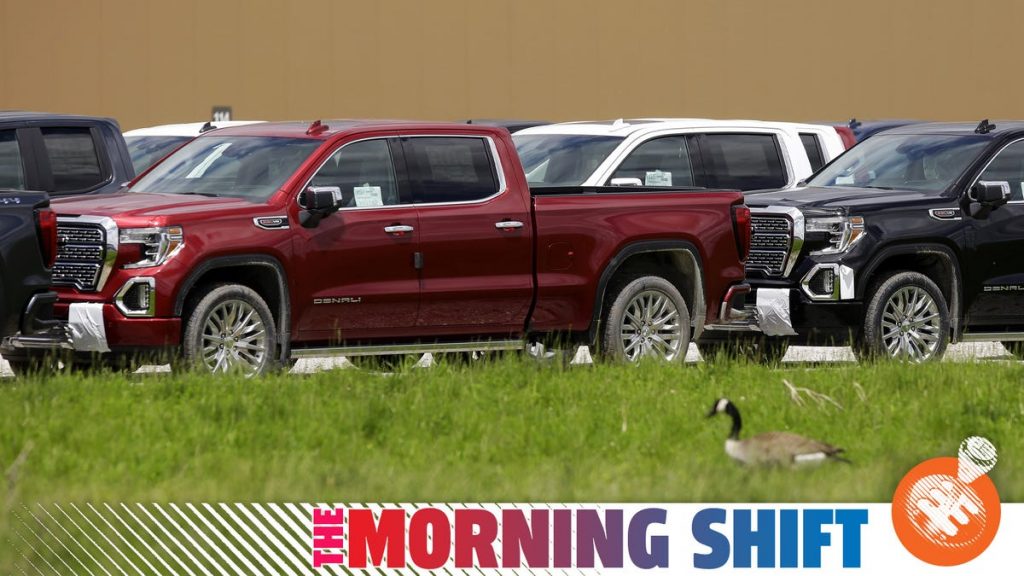General Motors Is Working Through Backlog of Chip-Less Cars; Ford, Not So Much

Photo: Joshua Lott (Getty Images)
Ford and GM are having slightly different experiences getting semiconductors into their unsold cars that need them, Mazda will soon finally tell us about its electrification strategy and Stellantis’ dream of Jeep in China is officially over. All that and more in this spooky edition of The Morning Shift for Monday, October 31, 2022.
1st Gear: Everyone’s Working Through It
A decent indicator of the status of the ongoing supply chain situation is how many vehicles automakers are still waiting to ship lacking semiconductors. General Motors reportedly worked through three quarters of its backlog of 95,000 cars and trucks awaiting chips in the third quarter of 2022, while Ford moved in the opposite direction. Its backlog doubled from 20,000 to 40,000 cars over the period, per Automotive News. These situations have had differing effects on both companies’ balance sheets:
The financial results both companies reported last week show the importance of being able to get those vehicles to dealerships and into customers’ hands. GM’s net income rose 37 percent from a year earlier to $3.3 billion, and its revenue surged to a third- quarter record, partly as a result of those shipments.
Meanwhile, Ford’s earnings were were hampered by its increased backlog, as well as a planned wind down of its self-driving partner, Argo AI. A $2.7 billion noncash charge related to Ford’s investment in Argo swung the automaker to an $827 million net loss.
Executives from both companies agree that silicon is flowing a little more readily than it was about this time in 2021, but then silicon availability wasn’t the only concern facing automakers:
“Chips are getting better, certainly, than they were a year ago,” GM CFO Paul Jacobson said. He said GM is still building some vehicles without certain parts but not at the volume seen earlier.
Ford said it expects a roughly 15 percent year-over-year increase in wholesale shipments during the fourth quarter and projected that full-year volume would be up 10 percent from 2021. It forecast adjusted earnings of $11.5 billion, which is at the low end of its earlier outlook because of continued supply-chain issues, even though CFO John Lawler said the chip crisis is lessening.
“It’s not easing tremendously; it’s easing slightly,” Lawler said. “But then we’re seeing issues in nonchip suppliers. It has to do with the tight labor market, but … we’re finding with many of the suppliers during the COVID time frame had not invested in maintenance or in their facilities and tooling, and so they’re not able to ramp as we expected.”
G/O Media may get a commission
Instant Facelift
Think of the Foreo Bear as exercise for your face, engaging muscles to provide radiance and lift with lasting results.
The rest of Auto News’ story focuses on the consequences of Ford shutting down its Argo AI joint venture with Volkswagen. The Blue Oval isn’t feeling very bullish on the future of autonomous driving, choosing instead to shift those resources to enhancing BlueCruise’s Level 2 and 3 capabilities in the near term:
When Ford eventually does develop Level 4 technology, Lawler said it’s expected to focus on commercial services such as package delivery, which it had been testing in various cities with Argo.
Farley said Ford plans to hire “a couple hundred” Argo employees to expand and accelerate development of technology categorized as Level 2 Plus and Level 3 because they rely on more driver interaction.
What’s especially telling is how Doug Field, Ford’s chief advanced technology officer who previously managed Apple’s Project Titan, feels about all this:
Doug Field, Ford’s chief advanced product development and technology officer, said creating fully autonomous vehicles is the most difficult challenge facing the industry.
“It’s harder than putting a man on the moon,” he said.
That tracks.
2nd Gear: Ford Offers White-Collar Employees a Choice
That choice being severance or a performance improvement program. If you’ve been at the automaker for eight years or more and your work has been deemed unsatisfactory, those are the options given to you, per the Wall Street Journal:
The changes in its talent-management policy mostly focus on employees who have eight or more years of service and whom the company has identified as demonstrating a pattern of declining performance, according to an internal email reviewed by The Wall Street Journal and confirmed by a company spokeswoman.
These employees now have the option of taking the severance, rather than enroll in the enhancement plan, which can take four to six weeks, the email and spokeswoman said.
Those who instead choose the enhancement plan but fail to improve won’t be eligible for any severance, according to the Oct. 4 email, which went to all U.S. managers.
The changes are intended to simplify how managers confront poor performance and provide an alternative to the improvement plan, which can be an intense period of work for employees who have made up their minds, the Ford spokeswoman said.
On the other hand, if you’ve been at Ford for less than eight years, the company will just cut you loose with severance, WSJ said it was told by a spokesperson. For those employees, Ford is willing to assist with job placement.
The excuse for all of this, as ever, is Tesla:
The U.S. auto maker made moves to streamline its white-collar workforce in recent months as part of a broader effort to slash costs by about $3 billion annually by 2026. The belt-tightening aims to free up more money to fund a costly long-term transition to electric vehicles, a market that is now dominated by rival Tesla Inc.
In August, the Dearborn, Mich., auto maker said it was laying off about 3,000 salaried and contract workers in the U.S., Canada and India, a move that followed months of company executives signaling to Wall Street that it needed to reduce staffing levels.
At the same time, the company is expected to take on 3,030 hourly workers, mostly in Michigan. That number is very close to the number of employees Ford laid off in August, and there’s likely a good reason for that: state incentives.
3rd Gear: Mazda Has a Grand Plan
This whole time you’ve been counting out Mazda, thinking to yourself that the “Zoom Zoom” company has no interest in electrification, no compelling products and no plan for the future. Well, Mazda is eager to prove you wrong, per a report from Automotive News. It actually has a great EV strategy that it’s been holding onto and refusing to publicize for almost a year. And when you hear it, it’s going to blow you away.
But you can’t hear it yet! You have to wait two more weeks.
Mazda Motor Corp., navigating a delicate shift to the electric vehicle era amid the launch of a new line of large crossovers, plans to finally unveil an updated midterm plan in November to fine-tune its EV strategy and unveil a new “brand purpose” that lays out a roadmap to 2030.
The Hiroshima-based carmaker had originally hoped to announce the revision last spring.
But the move was derailed by fresh uncertainty dumped on the market by the war in Ukraine, continuing pandemic lockdowns in China and ongoing upheaval in the global supply chain.
Rapidly shifting regulatory frameworks – as exemplified by new EV incentives provided for in the U.S. Inflation Reduction Act – added to the unpredictable market direction.
“It took a long time because there has been so much change,” said one executive familiar with the new plan. “We tried to absorb and take into account all the changes for a clear roadmap.”
Mazda announces fiscal second-quarters earnings on Nov. 10, and the updated business plan is expected to be announced afterward by the end of the month.
Some will pray nightly between now and November 10 that the plan will resurrect that long-rumored holy grail, rear-wheel-drive, inline-six powered sedan the manufacturer was supposedly going to build. Don’t do that — you want Mazda to succeed, don’t you?
4th Gear: Bankruptcy for Jeep in China
Stellantis’ partnership with Guangzhou Automotive Group, or GAC, to leverage the Jeep brand in China has been unraveling for some time. On Monday the joint venture filed for bankruptcy. From Automotive News:
The venture between Stellantis and Guangzhou Automobile Group producing Jeep vehicles in China will file for bankruptcy, the companies said, after a lengthy decline for the oldest foreign auto brand in the world’s largest market.
Stellantis said in a statement on Monday it had fully impaired the value of its investment in the joint venture in its results for the first half of 2022. It also said it would continue to provide service to Jeep customers in China.
GAC, which approved the bankruptcy filing, said the joint venture had liabilities of almost 111 percent of its assets of 7.3 billion yuan ($1.00 billion).
The bankruptcy would not have a significant impact on GAC’s operations, the Chinese company said in a stock exchange filing.
The venture has not been a success. In 2021, the two companies sold half the cars they sold through 2020, numbering just over 20,000 vehicles. In 2022, they sold less than 2,000. In May, they sold one car.
5th Gear: A Tale of Two Self-Driving Trucking Startups
Autonomous trucking company TuSimple is reportedly under investigation by the the FBI, Securities and Exchange Commission and Committee on Foreign Investment for its connection to a China-based startup called Hydron. Hydron is developing self-driving trucks as well, albeit with hydrogen power, and the core issue is whether TuSimple made U.S.-developed technology available to Hydron and defrauded investors in the process, the Wall Street Journal reported Sunday:
Investigators at the FBI and SEC are looking at whether TuSimple and its executives—principally Chief Executive Xiaodi Hou—breached fiduciary duties and securities laws by failing to properly disclose the relationship, the people familiar with the matter said. They are also probing whether TuSimple shared with Hydron intellectual property developed in the U.S. and whether that action defrauded TuSimple investors by sending valuable technology to an overseas adversary, the people said.
Hydron was started in 2021 by Mo Chen, TuSimple’s co-founder. He incorporated Hydron in China, Hong Kong and Delaware, according to public filings, with a plan to build hydrogen-powered trucks in North America modeled on a design by a subsidiary of a Chinese state-controlled auto manufacturer. People familiar with the matter said Hydron’s operations are mostly in China, where Mr. Chen spends most of his time. The startup was backed by Chinese investors.
The intertwined history of these two companies goes even deeper than that. At one time, TuSimple nearly purchased freight trucks from Hydron, according to a TuSimple spokesperson referenced in the story. Hydron has poached TuSimple employees before, and its executives have board influence in TuSimple as well. For example:
The 2021 Cfius [Committee on Foreign Investment] probe looked in part at a 20% stake in TuSimple controlled by investor Charles Chao, chairman of Sina Corp., a Chinese technology conglomerate. He also is an investor in Hydron, and a confidant and adviser to Messrs. Hou and Chen, said people familiar with the matter. Mr. Chao didn’t respond to requests for comment.
Cfius early this year required that Mr. Chao relinquish his two TuSimple board seats and that the company better secure its data and technology. In a February filing to the SEC, TuSimple said that Cfius “determined that there are no unresolved national security concerns” following TuSimple’s agreement with the panel. As part of the agreement, TuSimple appointed to its board a former U.S. national-security official.
WSJ was told that Mo Chen — TuSimple’s co-founder who later started Hydron — is no longer an employee of the former. However, Chen does appear to hold an almost 12 percent stake in the company. These are what we call red flags.
Reverse: Remembering Greg
October 31 marks the anniversary of Canadian open-wheel racing phenom Greg Moore’s death in 1999 at the age of 24. Amid the countless tributes, one in podcast form organized by journalist Marshall Pruett upon the 20th anniversary of Moore’s passing in 2019, uniting several racing talents that knew him well, is worth a listen today.
Neutral: What Are You Doing/Did You Do for Halloween?
I normally don’t do much, but this year I saw Rocky Horror Picture Show for the first time, in tandem with a live performance, with a couple of friends. What a trip.




